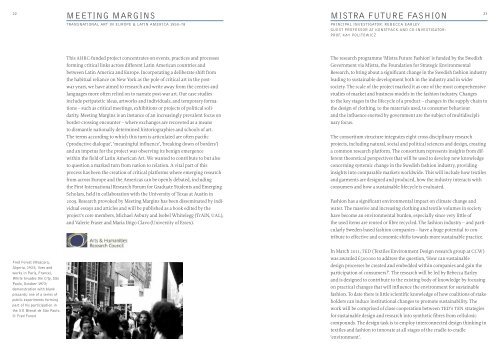graduate school directory 2011/12 - Camberwell College of Arts ...
graduate school directory 2011/12 - Camberwell College of Arts ...
graduate school directory 2011/12 - Camberwell College of Arts ...
Create successful ePaper yourself
Turn your PDF publications into a flip-book with our unique Google optimized e-Paper software.
22<br />
fred forest (Mascara,<br />
Algeria, 1933; lives and<br />
works in Paris, france),<br />
White Invades the City, São<br />
Paulo, October 1973;<br />
demonstration with blank<br />
placards; one <strong>of</strong> a series <strong>of</strong><br />
public experiments forming<br />
part <strong>of</strong> his participation in<br />
the XII Bienal de São Paulo.<br />
© fred forest<br />
MEETING MARGINS<br />
TRANSNATIONAL ART IN EUROPE & LATIN AMERICA 1950–78<br />
This AHRC-funded project concentrates on events, practices and processes<br />
forming critical links across different Latin American countries and<br />
between Latin America and Europe. Incorporating a deliberate shift from<br />
the habitual reliance on New York as the pole <strong>of</strong> critical art in the post-<br />
war years, we have aimed to research and write away from the centres and<br />
languages more <strong>of</strong>ten relied on to narrate post-war art. Our case studies<br />
include peripatetic ideas, artworks and individuals, and temporary formations<br />
– such as critical meetings, exhibitions or projects <strong>of</strong> political solidarity.<br />
Meeting Margins is an instance <strong>of</strong> an increasingly prevalent focus on<br />
border-crossing encounter – where exchanges are recovered as a means<br />
to dismantle nationally determined historiographies and <strong>school</strong>s <strong>of</strong> art.<br />
The terms according to which this turn is articulated are <strong>of</strong>ten pacific<br />
(‘productive dialogue’, ‘meaningful influence’, ‘breaking down <strong>of</strong> borders’)<br />
and an impetus for the project was observing its benign emergence<br />
within the field <strong>of</strong> Latin American Art. We wanted to contribute to but also<br />
to question a marked turn from nation to relation. A vital part <strong>of</strong> this<br />
process has been the creation <strong>of</strong> critical platforms where emerging research<br />
from across Europe and the Americas can be openly debated, including<br />
the First International Research Forum for Graduate Students and Emerging<br />
Scholars, held in collaboration with the University <strong>of</strong> Texas at Austin in<br />
2009. Research provoked by Meeting Margins has been disseminated by individual<br />
essays and articles and will be published as a book edited by the<br />
project’s core members, Michael Asbury and Isobel Whitelegg (TrAIN, UAL),<br />
and Valerie Fraser and Maria Iñigo Clavo (University <strong>of</strong> Essex).<br />
MISTRA fUTURE fASHION<br />
PRINCIPAL INVESTIGATOR: REBECCA EARLEY<br />
GUEST PROfESSOR AT KONSTfACK AND CO-INVESTIGATOR:<br />
PROf. KAY POLITOWICZ<br />
The research programme ‘Mistra Future Fashion’ is funded by the Swedish<br />
Government via Mistra, the Foundation for Strategic Environmental<br />
Research, to bring about a significant change in the Swedish fashion industry<br />
leading to sustainable development both in the industry and in wider<br />
society. The scale <strong>of</strong> the project marked it as one <strong>of</strong> the most comprehensive<br />
studies <strong>of</strong> market and business models in the fashion industry. Changes<br />
to the key stages in the lifecycle <strong>of</strong> a product – changes in the supply chain to<br />
the design <strong>of</strong> clothing, to the materials used, to consumer behaviour<br />
and the influence exerted by government are the subject <strong>of</strong> multidisciplinary<br />
focus.<br />
The consortium structure integrates eight cross-disciplinary research<br />
projects, including natural, social and political sciences and design, creating<br />
a common research platform. The consortium represents insights from different<br />
theoretical perspectives that will be used to develop new knowledge<br />
concerning systemic change in the Swedish fashion indus try, providing<br />
insights into comparable markets worldwide. This will include how textiles<br />
and garments are designed and produced, how the industry interacts with<br />
consumers and how a sustainable lifecycle is evaluated.<br />
Fashion has a significant environmental impact on climate change and<br />
water. The massive and increasing clothing and textile volumes in society<br />
have become an environmental burden, especially since very little <strong>of</strong><br />
the used items are reused or fibre recycled. The fashion industry – and particularly<br />
Sweden-based fashion companies – have a huge potential to contribute<br />
to effective and economic shifts towards more sustainable practice.<br />
In March <strong>2011</strong>, TED (Textiles Environment Design research group at CCW)<br />
was awarded £500 000 to address the question, ‘How can sustainable<br />
design processes be created and embedded within companies and gain the<br />
participation <strong>of</strong> consumers?’. The research will be led by Rebecca Earley<br />
and is designed to contribute to the existing body <strong>of</strong> knowledge by focusing<br />
on practical changes that will influence the environment for sustainable<br />
fashion. To date there is little scientific knowledge <strong>of</strong> how coalitions <strong>of</strong> stakeholders<br />
can induce institutional changes to promote sustainability. The<br />
work will be comprised <strong>of</strong> close cooperation between TED’s TEN strate gies<br />
for sustainable design and research into synthetic fibres from cellulosic<br />
compounds. The design task is to employ interconnected design thinking in<br />
textiles and fashion to innovate at all stages <strong>of</strong> the cradle-to-cradle<br />
‘environment’.<br />
23



